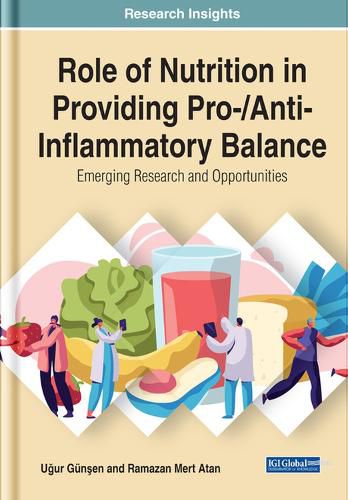Readings Newsletter
Become a Readings Member to make your shopping experience even easier.
Sign in or sign up for free!
You’re not far away from qualifying for FREE standard shipping within Australia
You’ve qualified for FREE standard shipping within Australia
The cart is loading…






This title is printed to order. This book may have been self-published. If so, we cannot guarantee the quality of the content. In the main most books will have gone through the editing process however some may not. We therefore suggest that you be aware of this before ordering this book. If in doubt check either the author or publisher’s details as we are unable to accept any returns unless they are faulty. Please contact us if you have any questions.
Food selection plays an important role in ensuring pro- and anti-inflammatory balance. Certain foods are responsible for increasing inflammation while others have anti-inflammation properties. Western diets especially, rich in red meat, simple carbohydrates, and refined grains, increase the levels of pro-inflammatory markers, C-reactive protein (CRP), and interleukin-6 (IL-6). Additionally, short- and long-chain fatty acids, various micronutrients including zinc, selenium, iron, vitamin A, probiotics, and prebiotic foods affect inflammation. As inflammation can be linked to a variety of diseases, more studies are needed about nutrition and its ability to prevent inflammation. Role of Nutrition in Providing Pro-/Anti-Inflammatory Balance: Emerging Research and Opportunities is an essential publication that examines balancing inflammation through nutrition and nutritional strategies. Firstly, information about the formation process of inflammation, biomarkers used for diagnosis, diseases affected by inflammation, and their incidence in society are discussed. Subsequently, balancing inflammation in individuals through macro- and micro-nutrient consumption, nutritional supplements (probiotics and prebiotics), bioactive proteins and peptides, and dietary forms is examined. Featuring research covering a broad range of topics including food supplements, diet types, and bioactive proteins, this book is ideally designed for nutritionists, dieticians, clinicians, doctors, nurses, healthcare providers, researchers, academicians, and students.
$9.00 standard shipping within Australia
FREE standard shipping within Australia for orders over $100.00
Express & International shipping calculated at checkout
This title is printed to order. This book may have been self-published. If so, we cannot guarantee the quality of the content. In the main most books will have gone through the editing process however some may not. We therefore suggest that you be aware of this before ordering this book. If in doubt check either the author or publisher’s details as we are unable to accept any returns unless they are faulty. Please contact us if you have any questions.
Food selection plays an important role in ensuring pro- and anti-inflammatory balance. Certain foods are responsible for increasing inflammation while others have anti-inflammation properties. Western diets especially, rich in red meat, simple carbohydrates, and refined grains, increase the levels of pro-inflammatory markers, C-reactive protein (CRP), and interleukin-6 (IL-6). Additionally, short- and long-chain fatty acids, various micronutrients including zinc, selenium, iron, vitamin A, probiotics, and prebiotic foods affect inflammation. As inflammation can be linked to a variety of diseases, more studies are needed about nutrition and its ability to prevent inflammation. Role of Nutrition in Providing Pro-/Anti-Inflammatory Balance: Emerging Research and Opportunities is an essential publication that examines balancing inflammation through nutrition and nutritional strategies. Firstly, information about the formation process of inflammation, biomarkers used for diagnosis, diseases affected by inflammation, and their incidence in society are discussed. Subsequently, balancing inflammation in individuals through macro- and micro-nutrient consumption, nutritional supplements (probiotics and prebiotics), bioactive proteins and peptides, and dietary forms is examined. Featuring research covering a broad range of topics including food supplements, diet types, and bioactive proteins, this book is ideally designed for nutritionists, dieticians, clinicians, doctors, nurses, healthcare providers, researchers, academicians, and students.